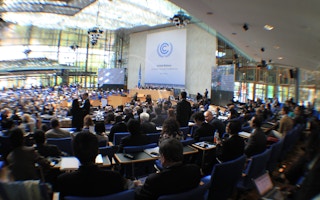The next UN climate change conference is scheduled to be held in a week’s time from 6-17 November in Bonn, Germany, which is home to the climate change secretariat and 18 other UN agencies that will be hosting the conference.
Presided over by the government of Fiji, COP 23 is slated to be a “working COP”, as negotiators continue to develop the Paris rulebook—the rules and working processes that will underpin the Paris Agreement’s implementation. With respect to the rulebook, no major decisions are expected to be made before 2018.
One agenda item does stand out at this climate meeting, however. The 2018 Facilitative Dialogue (FD2018) will be launched at COP 23 and held throughout 2018.
In this dialogue, Parties will take stock of what has been done collectively to achieve the long-term temperature goal of 1.5 degrees Celsius set out in the Paris Agreement. This will aid countries in the preparation of a more ambitious set of nationally determined contributions (NDCs) or Paris pledges by 2020 to keep in line with scientific recommendations to peak emissions by 2020.
Indeed, a key pillar of the Paris Agreement is the ongoing cycle in which countries have to take stock of “collective efforts” every five years. All countries are expected to submit new or updated pledges by 2020, and every five years thereafter without backsliding.
In order to inform the new or updated NDCs, which countries will have to prepare, a facilitative dialogue in 2018 was scheduled.
The first formal “global stocktake” under the agreement is scheduled for 2023, with a second round of updated NDCs or pledges to be submitted by 2025 by all countries under the Paris Agreement.
Although extensive consultations were held during climate meetings held in May this year and the initial feedback published, experts have pointed out that there remain many questions relating to the purpose and scope of the FD2018.
For instance, Dr Lavanya Rajamani for the Centre for Policy Research wrote that it is not clear if “collective efforts” mean efforts only under the UN climate regime or also under other complementary multilateral processes, such as the Montreal Protocol, or the International Civil Aviation Organization. Both regimes managed to reach agreement to control harmful hydroflourocarbons and emissions from international flights from participating countries last year.
The design and structure of the FD2018 was also until recently left unclear. The outgoing Moroccan and incoming Fiji presidency of the COP have plans to apply the traditional Fijian Talanoa concept to encourage inclusivity, participation and transparency in the dialogue.
This involves the sharing of ideas, skills and experience through storytelling, during which parties can build trust and advance knowledge through empathy and understanding.
Through earlier consultations, Parties have expressed that they prefer to have an online platform to gather all inputs, which will include material like the Intergovernmental Panel on Climate Change (IPCC) special report on the impacts of global warming of 1.5 degrees C above pre-industrial levels and related global greenhouse gas emission pathways, blogs and reports. This platform will classify information according to the topic and meeting to which it is submitted.
“
The challenge at COP 23 is on how to ensure a coordinated, consistent and coherent approach to the development of outcomes across various processes that would best enable and encourage parties to take urgent action to address climate change and its impacts.
The Paris Agreement also does not state what type of outcomes are to be expected from the facilitative dialogue, leaving it to parties to determine whether it is to produce any outputs, and if so, in what form.
Sandeep Chamling Rai, senior advisor, global climate adaptation policy for WWF, notes that the FD2018 is a critical movement to prevent countries from setting the bar for climate action and carbon emissions reduction too low until 2030, the time countries are due to submit their NDCs. and needs to be done otherwise we may lock into lower ambition until the year 2030.
“The current NDC pledges are heading the world towards 2.7 to 4.5 degrees C. This is inadequate to meet the long-term temperature goal of above pre-industrial level as agreed in the Paris Agreement,” he said.
Analysis by the World Resources Institute underscores the need for Parties to carefully think about how to structure the FD2018 so that it delivers a strong political signal of their commitment to enhancing their NDCs by 2020.
However, it also notes the need for the process to not become overly burdensome, given that negotiators are expected to be spending the lion’s share of their time to developing the Paris rulebook and in doing so, ensure that the rules are able to address changes occurring in the real world.
This will not be an easy feat, given the scale of the work needed to be done in limited time. The latest Paris work programme progress tracker report from the UN climate secretariat reveals at least 60 parallel tasks in addition to ongoing negotiations under the Ad hoc Working Group of the Paris Agreement (APA), the platform where the Paris rulebook is being negotiated. There is still a lot of work left to be done to meet the 2018 deadline.
The challenge at COP 23 is on how to ensure a coordinated, consistent and coherent approach to the development of outcomes across various processes that would best enable and encourage parties to take urgent action to address climate change and its impacts. There is a critical need to arrive at a coherent package of decisions to make up the Paris rulebook by 2018 and COP 23 must deliver that interim progress.
Melissa Low is a research fellow at the Energy Studies Institute at the National University of Singapore. This article is written exclusively for Eco-Business.


















